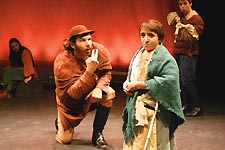Circular Logic
Open Circle Theatre adds fresh artistic layers to Brecht's bittersweet parable, while Arena dusts off the hatboxes
On paper, Bertolt Brecht’s plays don’t always settle well. Generally his works read like a gravelly stew simmered with tough hunks of meat and not enough broth, and it’s up to the reader to digest his intimate political philosophy and elegant prose, imagining the greater moral implications and testing his universal theories on war and peace. When his pages are transported to the stage, it’s an even heavier challenge for artists and audiences alike to retain all of the rich ingredients in Brecht’s hearty stew.
Whatever the challenges are in producing Brecht, they haven’t stopped Open Circle Theatre from presenting his epic Caucasian Chalk Circle, a bittersweet parable centered around the love between a servant and a soldier and a mother and her son. With an energetic cast of 16, Open Circle Theatre carries the meaning of ”diversity” to new heights, featuring actors and designers with and without disabilities, of various ages and ethnicities.
 |
It’s a difficult beast of a play to work through, and co-directors Monique Holt and Grady Weatherford employ the use of American Sign Language to add further depth and weight to the already bloated saga. The mordant irony of Brecht is delivered by a melodramatic pageant of slow and surreal scenes that are often interrupted by intense visual language and offbeat songs composed by Fahir Atakoglu, whose steamy score of exotic melodies are tempered by Arabian and other Eastern influences.
”Terrible is the seductive power of goodness,” the Story Teller portends, and with this Grusha Vashnadze is swayed by her inherent conscience to flee Persia with a royal baby boy in her arms, saving the abandoned infant from certain death. She has promised to marry a local soldier, but she also vows to care for the young child, rearing him as her own flesh and blood. Years later when the birth mother decides to claim her only son, an unscrupulous judge draws a circle of chalk, demanding that each mother attempt to pull the boy from the inner circle.
The heart of Brecht’s drama doesn’t reside in either the first or second act, but is torn between two valuable bookends of the play, concerning a dilemma in a small village in Caucasus. Eva Salvetti offers a grand performance as the mistress of ceremonies who cleverly weaves the tales together, and she is served well by Melanie Clark’s bright, inspired costumes and lush lighting from Marianne Meadows.
|
The mother’s love story is ultimately told through Suzanne Richard, who has the ability to elicit strong emotional responses with her honest interpretations of character and motive. Her Grusha is an optimistic peasant tinged with the kind of sadness that comes from growing weary with the burden of hope. The second act marks the welcome return of Scot McKenzie to the local stage as Azdak, the ”drunken onion” judge. Despite expert acting from McKenzie, his story is quickly lost in a confusing series of mock court trials and manic passages scattered around the stage.
Caucasian Chalk Circle is certainly no easy feat to mount, but Open Circle Theatre has dared to add fresh artistic layers to its allegory, creating a strong and muscular rendering of Brecht’s post-war parable.
The opposite revival effect has cropped up on stage over at the Kreeger Theater. It’s old hat for Arena Stage’s third reproduction of Regina Taylor’s Crowns. The 2004 recipient of the Helen Hayes Award for Outstanding Resident Musical just doesn’t stand out in a crowd anymore, due largely in part to bland and recitative staging that fails to live up to the sky-high expectations Arena has built into their audiences.
|
It’s a bare skeleton of a musical that’s tall on pageantry and short on substance. Adapted from the book ”Crowns: Portraits of Black Women in Church Hats” by Michael Cunningham and Craig Marberry, Taylor’s sparse musical version is an artless coming-of-age story. Her protagonist is Yolanda, a Brooklyn teenager who is sent to live with Grandma Elsie in Darlington, S.C. after her older brother dies in a shooting. Yolanda learns the historical significance of donning ornate hats in the African-American tradition, and gains acceptance and understanding from the elitist society of church hens in her grandmother’s community.
Those waiting for a dazzling spectacle of head ornamentation would be better served by recalling Helen Q. Huang and Catherine Zuber’s magnificent millinery masterpieces from last season’s Far Away at the Studio Theatre. Here, Emilio Sosa’s hats are all so-so, and the uniformly generic costumes have a plain symmetry in the same vein as a toothy theme park ensemble.
But the show is a bona fide money machine, no doubt, and those who identify with church culture in the South will be satiated by the loose spirit of nostalgia flowing freely through Crowns. There are witty one-liners and sassy monologues detailing the ”Hat Queen Rules,” guidelines filled with all kinds of ”hat-isms,” from how to hug in a hat, to how to flirt with a hat, to how to buy a hat with dignity and grace. All of this grand talk of chic chapeaux feels forced and even hollow, and at nearly two hours without an intermission, Crowns recycles the same whipped themes over and over and over again.
The stars of the evening are Gretha Boston and Barbara D. Mills, and these ladies know how to deliver glorious gospel music. They are amplified by Rick Menke’s superb sound design, and Boston’s soulful version of ”His Eye is on the Sparrow” is a rousing showstopper, while Mills delights with her hilarious facial expressions and a mere gesture in the right direction.
In the end, Crowns amounts to little more than a finger-flailing sermon with occasional musical interludes, and it just doesn’t justify a second afterlife for such a gaunt musical.
Nevertheless, if you are determined to hang on to your coveted tickets, you can be assured of two things: one, you will be entertained, and two, you will be entertained.
Support Metro Weekly’s Journalism
These are challenging times for news organizations. And yet it’s crucial we stay active and provide vital resources and information to both our local readers and the world. So won’t you please take a moment and consider supporting Metro Weekly with a membership? For as little as $5 a month, you can help ensure Metro Weekly magazine and MetroWeekly.com remain free, viable resources as we provide the best, most diverse, culturally-resonant LGBTQ coverage in both the D.C. region and around the world. Memberships come with exclusive perks and discounts, your own personal digital delivery of each week’s magazine (and an archive), access to our Member's Lounge when it launches this fall, and exclusive members-only items like Metro Weekly Membership Mugs and Tote Bags! Check out all our membership levels here and please join us today!


















